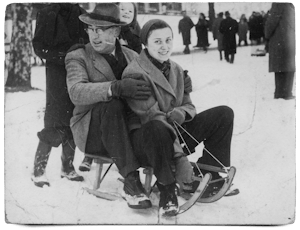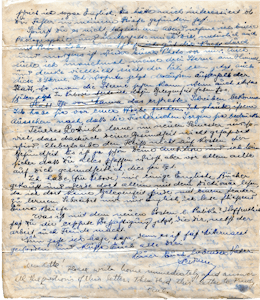Trude Silman
Trude Silman was born into a Jewish family in Czechoslovakia. When she was 9 years old, she escaped Nazi persecution as a child refugee and came to England.



Trude was born in April 1929, the youngest of three children in a happy middle-class family in Bratislava, then in Czechoslovakia. In the same year as Trude was born, the Wall Street Crash contributed to the collapse of her father’s bank and affected the family’s income. Despite this, Trude had happy memories of her early childhood and playing with her older siblings, Charlotte and Paul. Although Trude attended a Jewish school, her family was not very religious.



Many people in Czechoslovakia, which was one of Europe’s few remaining democracies by 1938, were concerned about how the dangers of Nazism would affect their country. Although Trude had limited memories of Hitler’s rise to power in Germany, she vividly remembered hearing Hitler “shouting his speeches” down the radio. After the Anschluss of Austria in 1938, Trude’s father heard reports from family in Austria that the Nazis were treating Jewish people badly. He decided to send his family to stay with his mother in the countryside for a short time as he believed it would be safer.








After British Prime Minister Neville Chamberlain met with Hitler in October 1938, a region known as the Sudetenland was given to Germany in the hope that war could be avoided. Overnight, thousands of Czechoslovakians were subjected to Nazi rule. Trude recalled the sense of escalating danger. She remembered looking out of the classroom window to see Czech tanks in the street in March 1939, when the Germans invaded the remaining regions of Czechoslovakia. Trude’s schoolmaster told all of the pupils to get their coats and to go home. Trude did not go to school again and she became aware that everybody was anxious and waiting for the knock on the door at night because they knew that people were being taken away.



Trude’s parents were doing their utmost to get their three children out of Czechoslovakia to safety. Charlotte, aged 14, was the first to leave on 31 December 1938, ostensibly going to England to learn English. She lived near London with a foster family. Paul, Trude’s elder brother, also travelled to London in May 1939 after Trude had left, where he obtained a job at a furrier.
Trude’s time to leave came in early 1939. Her aunt Gita had permission to work in England as a domestic servant and could take her own daughter, Vera, and Trude with her. Trude had limited memories of leaving home:



“l have no recollection of saying goodbye, kissing, crying, anything, it’s just completely eradicated.”
The journey should have taken about 36 hours, but took four days due to various delays, including the train being repeatedly stopped by officials. Eventually they arrived at the Dutch port of Vlissingen, where they caught the ferry to Harwich, and then the train to Liverpool Street station in London.
Trude was very homesick in England. She lived with a number of foster families who did their best to look after her. Trude found the climate cold and she had to eat food that was unfamiliar to her, like boiled cabbage. She spent much of her first few months in England crying:


“So the house was draughty, I was cold, I’d never eaten toast, kippers, marmalade, porridge, all the things which are perfectly normal here. So I was desperately homesick.”

After moving to several other foster families, eventually Trude returned to London to stay with an uncle and aunt who were waiting for passage to America. Trude went to a local primary school and learnt to speak fluent English. When Trude’s aunt and uncle received their visas for America, Trude transferred to a boarding school. After war broke out in September 1939, Trude was evacuated to the countryside to keep her safe, as were many children who lived in big towns and cities. She first went to Rickmansworth and then to Cornwall where she spent most of the war.
In Cornwall, Trude received a good education, worked on the land, and helped the wider community. She kept in touch with her brother and sister in England by sending letters to each other. They occasionally were able to visit one another too. Trude received her High School Certificate in 1947, the same year she was naturalised as a British citizen.






Unable to afford to study medicine, Trudy won a scholarship to study biochemistry at Leeds University. While in Leeds, she met her future husband Norman Silman and they were married in December 1948. They had two children, after which Trude resumed her studies, gaining a special honours degree in biochemistry. Trude then had a varied career in research before becoming a college lecturer. She had five grandchildren.



During the war, Trude and her siblings received rare letters from their parents which would take many months to reach them. Some of these letters were sent through the Red Cross which meant that they were only 25 words long. After the war, Trude searched for her parents and discovered that her father died in Auschwitz, but she has never been able to determine what happened to her mother. Trude lived in Leeds and remained an active member of several voluntary organisations, including the Holocaust Survivors’ Friendship Association. She regularly spoke about her experiences as a child refugee fleeing the Holocaust. She was awarded an MBE in the Queen’s New Year’s Honours 2020 for her work in Holocaust education. She said,

“If we do not teach the lessons of the Holocaust correctly, then my family died for nothing.”



Can you help us?
Without the work of charities like ours, stories like Trude Silman's will be lost and forgotten. Please donate generously to ensure that Trude's story can a force for good in the modern world.
- £
